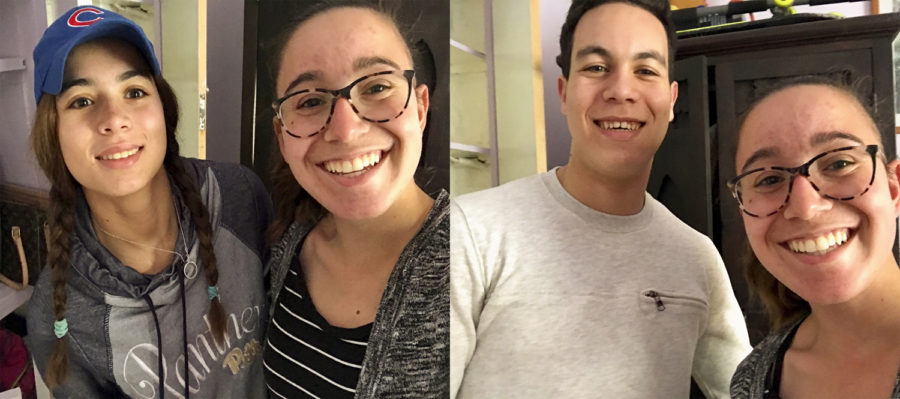Host families enrich the study abroad experience
Anna poses with her host siblings Fatine, 18, and Salem, 20, in the family’s apartment in Rabat, Morocco. (Photos by Anna Bongardino | Visual Editor)
I could hear the rhythmic chant of the afternoon adhan — the Islamic call to worship — ring out from the tinny rooftop speakers of nearby mosques from my second story bedroom in the city center of Rabat, Morocco. After the call to prayer subsided, a Moroccan woman who looked to be a few years younger than my mother walked through the door of my new bedroom and wrapped me in an affectionate embrace. She introduced herself as Hanan, my host mother, and immediately asked if I would like mint tea and a pastry — a traditional afternoon snack enjoyed by Moroccans.
By the end of my semester in Morocco, I was introducing my host parents to my American friends and family as my Mama and Baba — the Arabic words for mom and dad — and referring to my host siblings simply as my brother and sister.
I always knew I wanted to study abroad. The chance to experience a new culture, learn new languages, eat delicious food and get a break from regular college coursework? Those were easy selling points. But I vowed to never live with a host family. The thought of imposing upon another family for months and constantly embarrassing myself due to a language barrier did not seem appealing.
But as I embarked on a search for the perfect study abroad program, I quickly realized I would miss incredible opportunities if I opted to live in a dorm with other American students. While some aspects of my homestay mimicked the comforts of home, the most valuable experiences were those that couldn’t have been more different from life in the United States — and that I would not have experienced had I been surrounded by other Americans. Living with a host family gave me the opportunity to authentically experience Moroccan culture while making it easier to acclimate to the new customs and language of my host country.
Rabat, the coastal capital city of the North African country, has a population of slightly less than 600,000 people — about the same size as Milwaukee. The streets surrounding my family’s apartment were always bustling with citizens rushing to and from work in government buildings down the block or in one of the many cafes that lined each street. My school was 15 minutes from my family’s apartment through the crowded and winding streets of the medina — the walled center of the city that seemed like a labyrinthine maze to any foreigner.
My host sister walked me to and from school the first week while I got my bearings. In turn, I walked with her to a few basketball practices she asked me to take pictures of with my camera. We drove the same route to watch her games on weekends.

On Friday afternoons, we returned home alongside thousands of other Moroccan students and workers to eat couscous — a pasta dish my host mom served with cooked vegetables, chickpeas, hard boiled eggs and a thick milk drink — out of a large communal bowl. I was abroad for only a few weeks before I discovered I had a family I felt comfortable with, some routines and a favorite dish that I couldn’t find prepared as well at any restaurant.
Then one Saturday afternoon, while walking the same busy Rabat streets I followed to get to school, my host mother led me to the hammam, a public bath many Moroccans frequent on weekends. We weaved through crowds of shoppers, vendors and residents in the familiar medina but soon turned and entered a discrete doorway on a side street I’d never noticed before.
My host mom knew when to go — there are separate hours for men and women — and showed me which soap to get and where to put my clothes. She poured a large bucket of water over my head when I wasn’t washing myself with enough water. She arranged for a woman to scrub my body with the soap and wash my hair in a heated room filled with women of all ages washing their bodies and chatting for hours on end.
Had I gone as a foreigner, I wouldn’t have had the slightest clue where, when or how to coordinate that outing. While hammams may not be a staple cultural experience of every study abroad destination, every country has less commonly known experiences and traditions for visitors who are privy to them. Those experiences are even better and more accessible when you have a local to guide you through it.
And in almost any country you go to, some of these locals you meet will be able to hold a conversation in English and others won’t. Because my host parents were fluent in Arabic and French but didn’t speak more than a few words of English, I quickly learned the important role immersion played in language acquisition.
When my host mother asked me “Do you want tea?” during the first afternoon I spent with her in French — “Tu veux du thé?” — I stared back incredulously. I had to will my brain to recall a functional amount of the French I learned a few years prior if I wanted to be a temporary member of my host family.
My host parents could rely on my host siblings to translate if communication became too difficult. But as the weeks passed, I became increasingly determined to figure out a way to use my vocabulary to express myself to my host parents without help from another English speaker. I downloaded DuoLingo to fill the gaps in the vocabulary I remembered. When I spoke to my host mom about chores or trips I took with other students in my journalism program, I began to learn from my mistakes and accepted them as part of the process.
Speaking in another language out of necessity everyday replaced the fear and anxiety I anticipated with an unflinching resolve to improve. And what I earned was worth it —
I could navigate the city more easily and some of my most profound experiences of Moroccan culture were cultivated through conversation. One of the best nights I spent there was when my host brother and I sat up until 4 a.m. talking about marriage, catcalling, religion and American celebrities in a mix of French and English — something I couldn’t have done in a dorm room with other Americans.
Living with my host family led me to authentically experience the customs and traditions of Moroccan culture and exposed me to the daily lives of citizens in Rabat. And most importantly, I gained a new family. A few months after I reluctantly returned to the United States, my host brother called just to check in.
“Mama and Baba are well,” he said. “We all miss you.”


